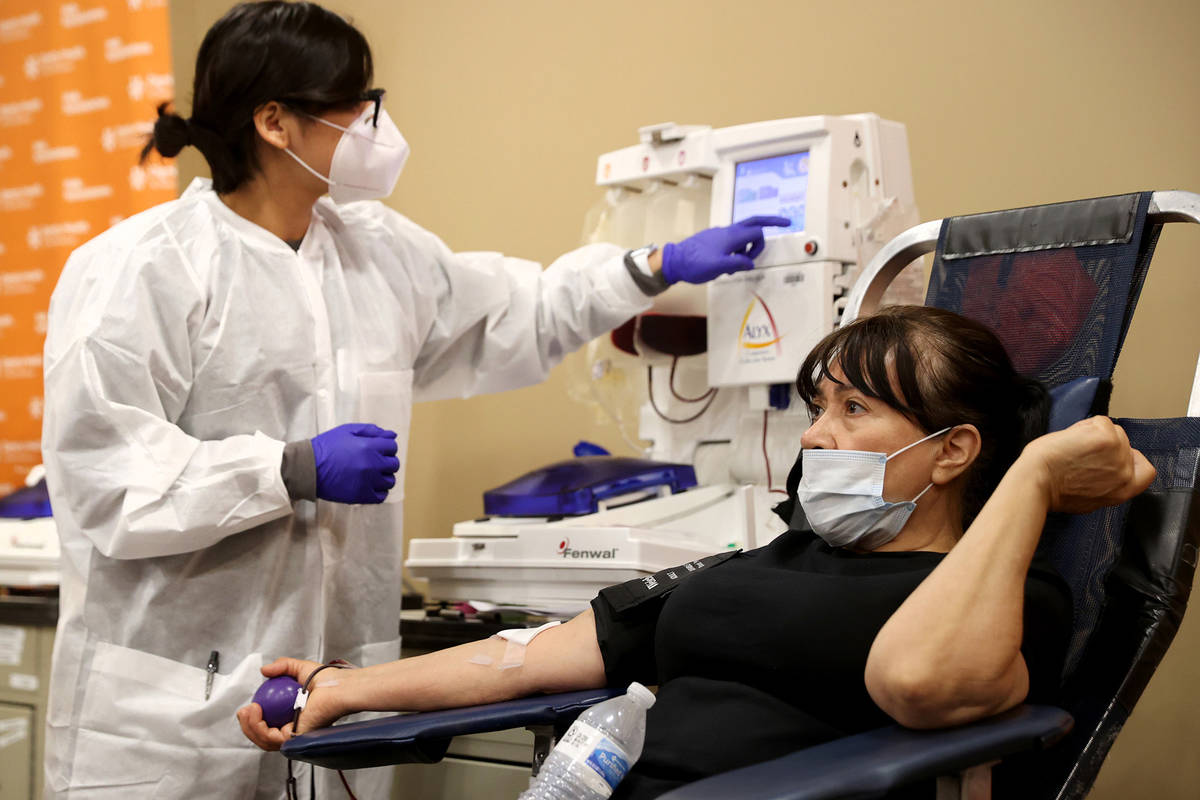Local hospitals take part in national study of COVID-19 antibodies

On Mother’s Day, Santos Garcia uttered his first phrase in weeks when he said “good morning” to family members during a video chat from his bed in a Henderson hospital where he is being treated for COVID-19.
After five weeks in the hospital, Garcia, 64, began to significantly improve following a transfusion of blood plasma from an unknown donor who had recovered from COVID-19. On Monday, his wife, Josefina, in turn donated her own plasma, known as convalescent plasma, “to give back,” she said in an interview during a plasma drive at St. Rose Dominican Hospital, Siena campus in Henderson, where her husband is being treated.
Several family members had tested positive for COVID-19, including Josefina, who said she had no symptoms of illness. But testing showed she had been infected by the new cornavirus and developed the antibodies made by her immune system to neutralize the virus.
The couple’s daughter Lissette attributed her father’s turnaround to receiving convalescent plasma. Before the transfusion, the hospital staff “didn’t know if he was going to make it,” she said, adding his doctors now think he’ll be ready to be released from the hospital in a few days.
Part of nationwide study
Plasma, the liquid part of the blood, contains antibodies, proteins produced by the immune system in response to a specific pathogen — in this case, the new coronavirus. Researchers across the country are investigating whether plasma from a person recovered from the new coronavirus can help a critically ill patient fight off the virus. Convalescent plasma has been used to treat multiple maladies, including other coronaviruses SARS and MERS.
The largest study is being led by Mayo Clinic, with than 2,200 hospitals across the U.S. participating, including Rose Dominican, Siena and Southern Hills Hospital and Medical Center in the southwest Las Vegas Valley.
The handful of patients treated with convalescent plasma at Rose Dominican, Siena all have been improving, said Dr. Brian Lipman, an infectious disease specialist at the hospital and an investigator in the study.
Patients who have shown dramatic improvement have included both a doctor and a nurse from the hospital, who became critically ill after treating infected patients. The doctor was released from the hospital within 36 hours of receiving plasma, and the nurse was able to be taken off the ventilator that was helping her breathe, and is expected to go home soon, he said.
It remains to be seen whether these results will be borne out in the larger Mayo Clinic study, Lipman said.
Across the valley at Southern Hills Hospital, the handful of patients who have received convalescent plasma all have survived, said Dr. Christopher Voscopoulos, who described the treatment as “rather hopeful.”
But patients are given a variety of treatments, so that it’s unclear at this time what, if any, contribution a particular treatment has made, said Voscopoulos, medical director of the hospital’s intensive care unit.
Plasma shortage
To find plasma for Lipman’s patients, the hospital had to “scour the country” to find a match, resulting in days of lost time.
“It’s pretty clear that the earlier you treat people with this, the better they’re likely to do,” he said.
“It becomes a very difficult question, when you have limited resources, about who gets plasma,” he said. So far, the hospital is targeting the treatment to critically ill patients who are deteriorating and expected to benefit the most, he said.
Part of the answer is to encourage more people to donate plasma, said Deb LaCava, the laboratory director at the Siena campus, who worked with Vitalant, a nonprofit community blood provider, to coordinate Monday’s convalescent plasma drive. The plasma collected during the drive will stay in the Las Vegas Valley.
One of Monday’s donors said he was donating with the aim of helping a family member hospitalized with COVID-19.
The man, who provided only his first name, Pedro, encouraged other potential donors to get involved. “If you want to get Nevada up and running, let’s do this,” he said.
Potential donors who have tested positive for COVID-19 and have been symptom-free for 14 days can go to Vitalant.org/covidfree to begin the application process to become donors.
Contact Mary Hynes at mhynes@reviewjournal.com or 702-383-0336. Follow @MaryHynes1 on Twitter.